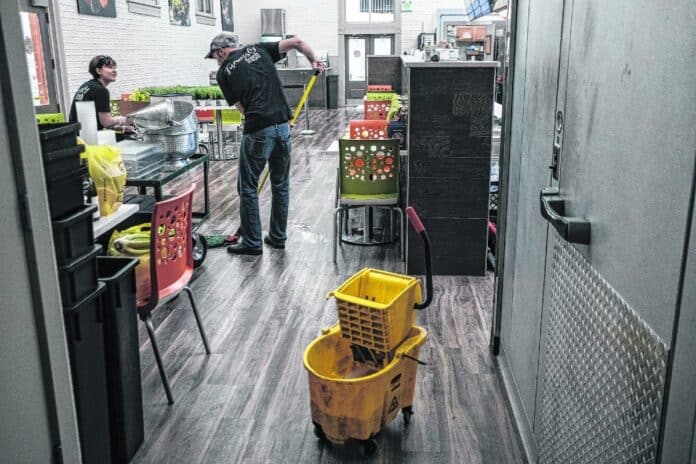
As scores of businesses across the country struggle to stay afloat during the coronavirus pandemic and millions of people seek unemployment aid, federal authorities and lenders are scrambling to implement a relief program for businesses that could be vital to the economy’s recovery.
On April 3, the U.S. Small Business Administration launched the Paycheck Protection Program, a $349 billion emergency loan program created to help small businesses retain workers and pay bills during the pandemic. It is part of the $2.2 trillion economic package passed by Congress last month.
The program provides largely forgivable loans or low-interest loans up to $10 million to small businesses, certain non-profits, veterans’ organizations, self-employed individuals, independent contractors, among others, according to the SBA.
The program, however, initially got off to a rocky start, with a range of technical and bureaucratic problems as hundreds of thousands of businesses submitted applications, The Associated Press reported.
[sc:text-divider text-divider-title=”Story continues below gallery” ]Click here to purchase photos from this gallery
As of Thursday, many businesses were still waiting for the cash infusion necessary to stay alive, according to wire reports. The U.S Small Business Administration now says it has corrected those problems on its end and some lenders said they expected to start dispersing funds on Thursday.
“I’ve talked with a couple of lenders who have just been working around the clock to help businesses in our area access the program,” said Cindy Frey, president of the Columbus Area Chamber of Commerce. “…It’s a lot of pressure on them right now to get these things done on behalf of our businesses.”
Small businesses, defined as companies employing 500 or fewer people, are a crucial part the U.S. economy, employing around half the workers in the private sector. As of last year, there were 512,348 small businesses in Indiana, employing 1.2 million people, according to the U.S. Small Business Administration.
About 96% of all business establishments in Bartholomew County employ fewer than 100 people and collectively make up about one-third of all jobs, said Jason Hester, president of the Greater Columbus Economic Development Corp.
“It’s often said that small businesses make up the fabric of a community, and with more than nine out of 10 establishments employing less than 100 persons, it’s easy to see why,” Hester said.
However, COVID-19 restrictions put in place in Indiana and other states have significantly impacted large and small businesses, resulting in companies reducing hours, laying off workers or shutting their doors altogether.
A record 16.78 million people in the United States have sought unemployment aid over the past three weeks on record, including 282,567 first-time claims in Indiana and 3,840 in Bartholomew County.
Lenders, for their part, have been given the “monumental” task of setting up an unprecedented lending program in a matter of days, with bank employees “working literally day and night” to shore up their systems for the volume of applications from businesses that they were anticipating.
Because of the tight timeline, some banks were ready to start accepting loans while other banks, large and small, said they hadn’t received the details of the program from the Treasury soon enough to be ready for the launch on April 3, according to wire reports.
However, officials at three financial institutions operating in Columbus — First Financial Bank, Old National Bank and Centra Credit Union — told The Republic that they were able to start accepting applications for the program on April 3, the day the program launched.
First Financial Bank, which has branch locations in Columbus, Hope, Edinburgh and Seymour, had received around 6,800 applications requesting more than $1.3 billion in loans as of Thursday morning, said Jeff Magginnis, SBA sales manager and senior vice president at First Financial Bank.
Those figures, however, include applications submitted by small businesses in Indiana, Ohio and Kentucky, not just Bartholomew County.
As of Thursday, the bank had approved more than 1,600 of the applications and has secured money for nearly 500 of them, Magginnis said, adding that First Financial Bank intended to start dispersing funds on Thursday.
“Even a little before Congress fully approved (the program), we began mobilizing our efforts and ramping those up significantly throughout last week to be ready to start taking applications on (April 3),” Magginnis said on Thursday. “What I can tell you is in our particular case, almost everybody in the bank is involved in this in some way, shape or form. …We knew it was going to be thousands of applications and a lot of dollars that would come through our bank.”
Old National Bank, which has three branch locations in Columbus, had, as of Wednesday, received around 4,500 applications from small businesses and other eligible applicants in Indiana, Kentucky, Michigan, Minnesota and Wisconsin, said spokeswoman Kathy Schoettlin.
Schoettlin said Old National Bank had reviewed and approved some applications as of Wednesday but was still receiving updated guidance from the SBA.
“We are still receiving updated guidance from the SBA,” Schoettlin said. “I know they’re working just as hard. It’s a monumental task, but we’ve had some challenges with their technology.”
Officials at Centra Credit Union, which is based in Columbus, have been working “around the clock” building infrastructure and processes from scratch to accommodate the needs facing local businesses, said Brad Davis, chief credit officer at Centra Credit Union.
As of Wednesday, nearly 200 businesses in Indiana had applied for the program through Centra Credit Union since April 3, Davis said.
“We felt it was very important for us to be on the front end and try to educate our members and to get them in the queue as quick as possible, while we, as an industry, were still working diligently to get up to speed on all the various components of the program,” Davis said.
“I think I’ve used the word ‘unprecedented’ more in the last month than I have in the rest of my life combined.”
Representatives from each of the financial institutions urged small business owners to go to their websites for more information about the program and other COVID-19 relief.
The Columbus Area Chamber of Commerce has held several webinars for local businesses and spoken with more than 85 local businesses about the new federal stimulus programs and other options for relief, Frey said.
The next webinars are scheduled for 9 a.m. and 2 p.m. Tuesday and are available to any business in the community, not just Chamber members, she said. Registration is available on the Chamber’s website.
“The Chamber’s goal is to get as much information into people’s hands so that they’re able to successfully apply for this support,” Frey said. “It’s really important for us that all of our businesses come out on the other side of this disruption. …A lot of businesses, especially our small businesses, are having a difficult time and there is a lot of uncertainty.”
“The good news is help is on the way.”
Paycheck Protection Program
The Paycheck Protection Program provides forgivable or low interest loans up to $10 million to small businesses struggling to meet payroll and day-to-day operating expenses due to the COVID-19 pandemic, according to the U.S. Small Business Administration.
Those eligible for the program include small businesses, certain non-profits, veterans’ organizations, self-employed individuals, independent contractors, and other businesses meeting size standards based on their North American Industry Classification System code.
The loans, which are being administered at the local level by a national network of banks and credit unions, are 100% backed by the SBA, are being provided to small businesses without collateral requirements, personal guarantees, SBA fees or credit tests.
The SBA says the program will be available through June 30.
“They are very short applications. They’re two pages long,” Frey said. “There’s no collateral. The loans are largely forgivable if they’re used appropriately, and that means primarily for payroll, but also for rent and utilities.”
The loans are available to cover up to eight weeks of average monthly payroll based on 2019 figures, plus 25%, and payments are deferred for six months, according to the SBA’s website.
The SBA says it will forgive the portion of loan used for payroll costs and other designated operating expenses for up to eight weeks, if at least 75% of loan proceeds are used for payroll costs. If for some reason the entire loan is not fully forgivable, it converts into a very low interest loan of 1% interest to be repaid over two years.
“Forgiveness is based on the employer maintaining or quickly rehiring employees and maintaining salary levels,” the SBA said. “Forgiveness will be reduced if full-time headcount declines, or if salaries and wages decrease.”
According to the SBA, eligible expenses for the eight-week forgiveness include:
Payroll costs (excluding the prorated portion of any compensation above $100,000 per year for any person.) Payroll costs include salary, commissions, tips, certain employee benefits including sick leave and health care premiums, and state and local taxes.
Mortgage interest (not prepayment or principal payments) and rent payments on mortgages and leases in existence after Feb. 15.
Utilities such as electricity, gas, water, transportation, phone and internet access for services that began before Feb. 15.
Additional wages paid to tipped employees.
Other relief programs
The SBA also has begun lending money to small businesses under its Economic Injury Disaster Loan program and is offering bridge loans that offer up to $25,000 in loan money with a quick turnaround, according to The Associated Press.
The SBA’s Economic Injury Disaster Loan is designed to help small businesses overcome a temporary loss of revenue as a result of the COVID-19 pandemic. Like the Paycheck Protection Program, small businesses with less than 500 employees, certain non-profits and veteran’s organizations are eligible to apply, according to the SBA.
“(It) is an interest-bearing loan, but like (Paycheck Protection Program), it’s not collateralized, so people are not putting up equipment or stock (as collateral). They aren’t having to collateralize the loan in either case,” Frey said. “The emergency loan is used all the time when there is a natural disaster, so that framework is there and it is an online application process. It does have an interest-bearing aspect, but you don’t have to start paying for a year and you’ll have 30 years to pay it. The bonus with the disaster loan is that it comes with a $10,000 advance and even if the SBA rejects your application for a loan, you get to keep the $10,000.”
Eligible businesses can apply to both, but not for the same expenses, Frey said.
There are other assistance available to small businesses, including deferred payments for other SBA-backed loans.
Frey said local businesses should be talking with their bankers, outside accounting, payroll services or their attorneys about their financial situation and what their options are.
“This is really unprecedented to have this kind of capital available to people in an emergency, fairly quickly, without a lot of strings attached,” she said.
[sc:pullout-title pullout-title=”Where to learn more” ][sc:pullout-text-begin]
Visit www.sba.gov/funding-programs/loans/coronavirus-relief-options for more information about COVID-19 relief for small businesses.
[sc:pullout-text-end][sc:pullout-title pullout-title=”Upcoming webinars” ][sc:pullout-text-begin]
The Columbus Area Chamber of Commerce is holding webinars about the new federal stimulus programs and other options for relief.
The next webinars are scheduled for Tuesday at 9 a.m. and 2 p.m. and are available to any business in the community, not just Chamber members.
Visit business.columbusareachamber.com/events/calendar to register.
[sc:pullout-text-end]




